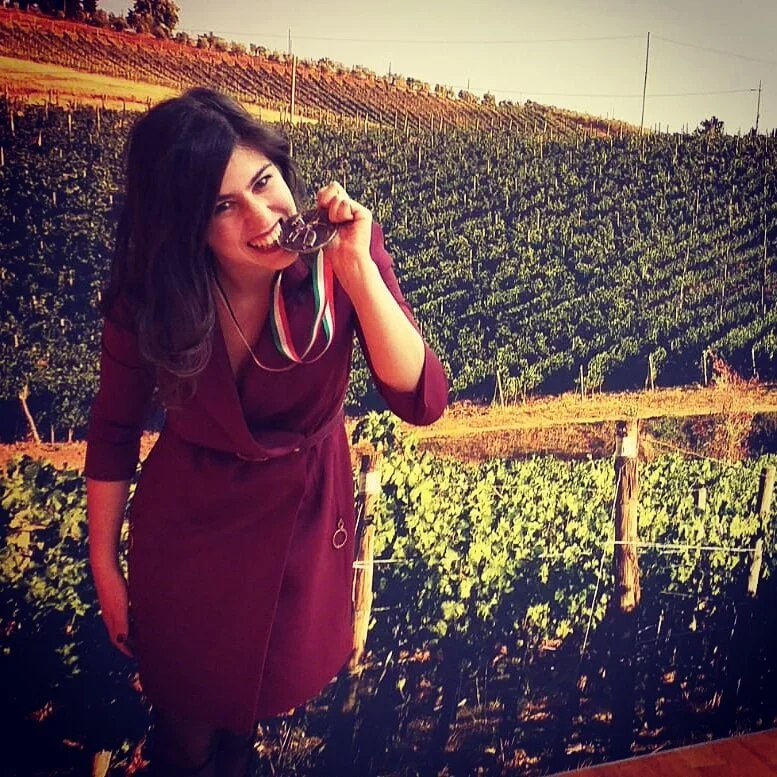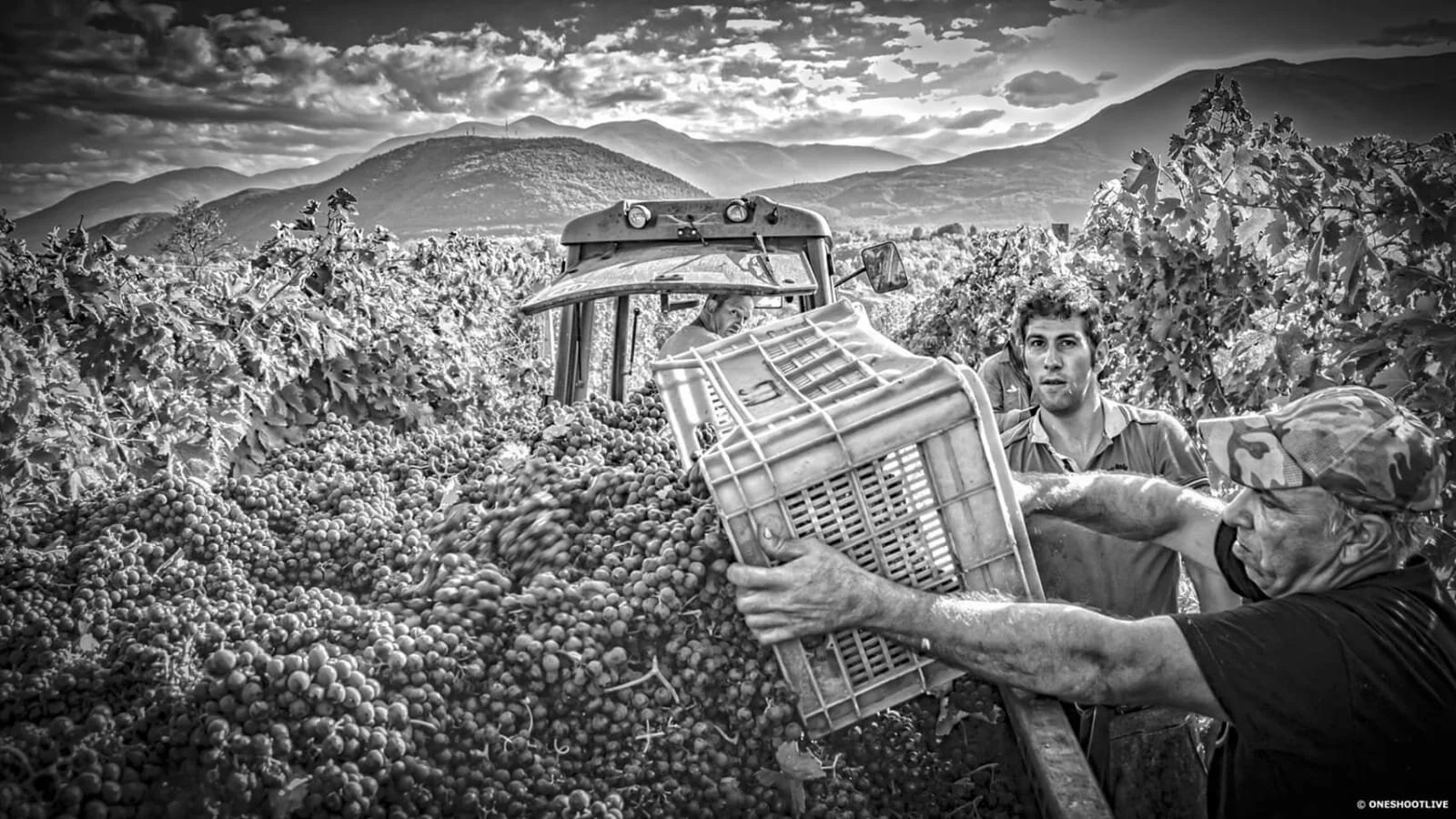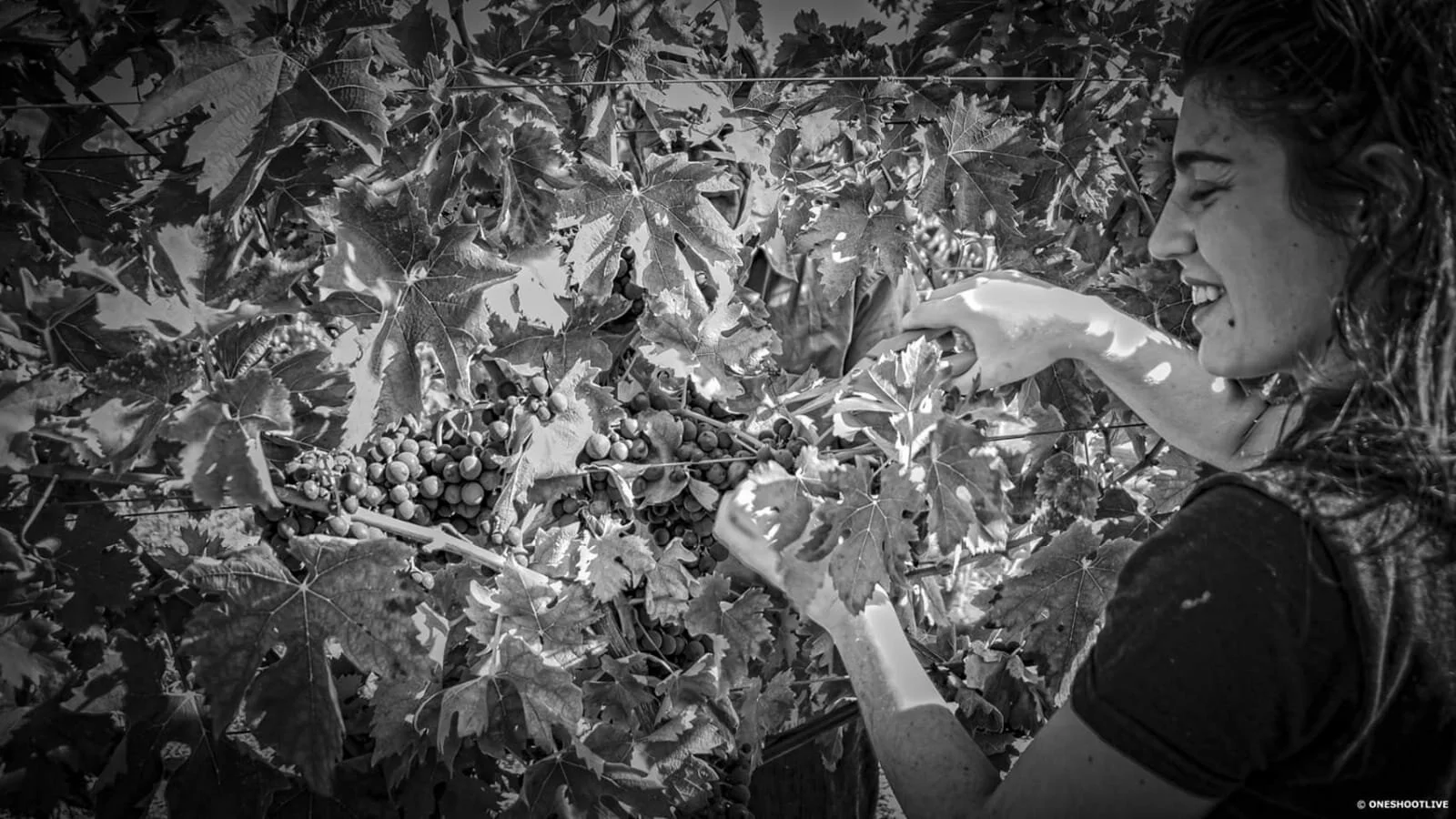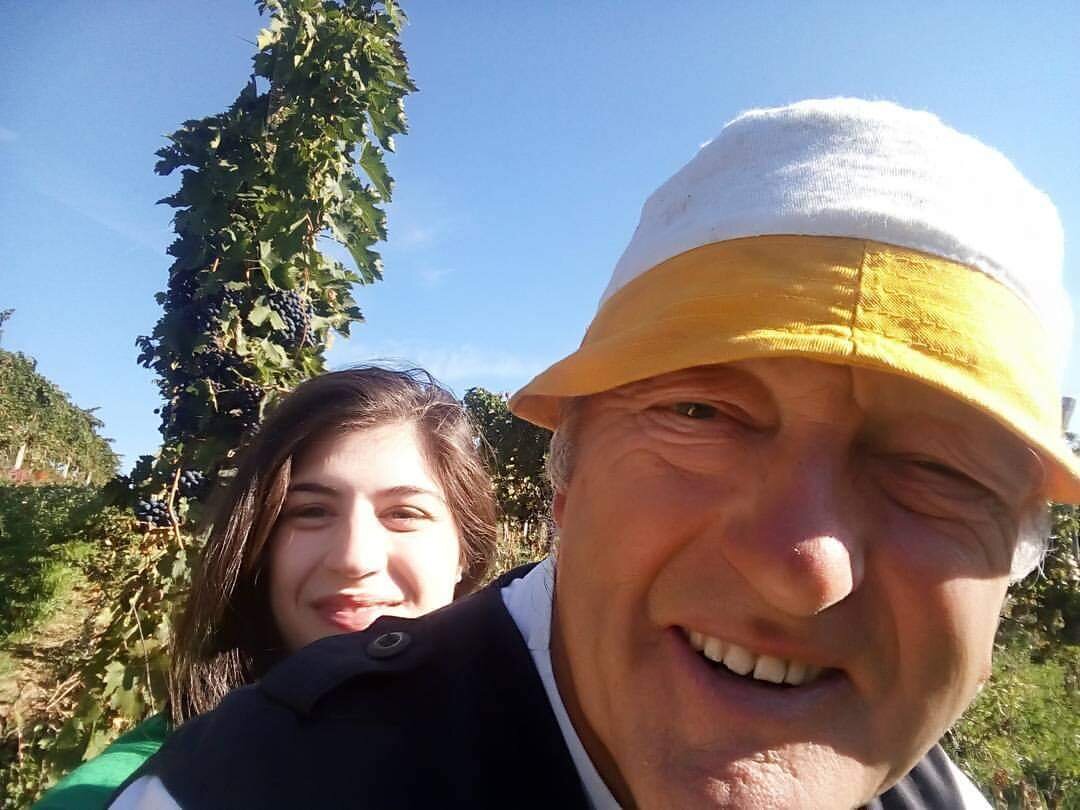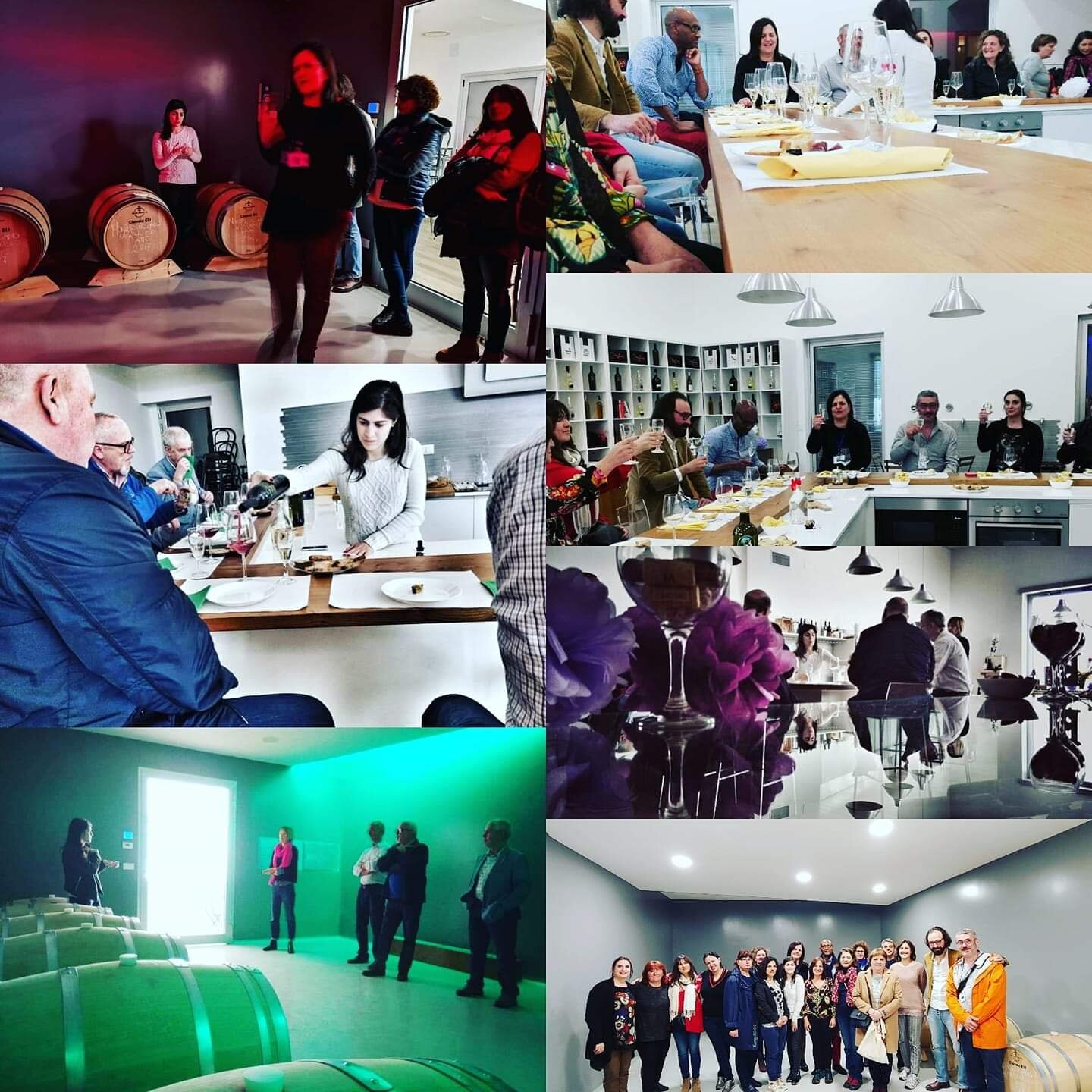Every once and while you come across a story that screams out to be made into a movie. This, with minimal artistic licence, is one of those stories.
The setting is Italy. Our protagonist is Francesca Margiotta, 27, a very sweet, kind, shy, strong-willed, determined and earnest person.
Francesca was born and raised in the Peligna Valley of the Abruzzo region, a relatively unknown area east of Rome. For 200 years, her family has grown grapes and made wine for local consumption on a modest vineyard. As a little girl, she followed her grandfather and father around the winery as they pruned, sprayed, harvested, fermented, and bottled.
They told her wine was in her blood. She believed them – literally at first.
(Lots of shots showing Francesca at different ages in the vineyards with the sun shining and the Apennine Mountains shimmering in the background. Francesca helping pick the grapes in the fall, and watching her grandfather and father make the wine. Great dialogue about wine and life.)
With no other siblings or cousins interested in the winery, when Francesca was a teen, she decided it was her fate to take over the family business from her father and grandfather. It was meant to be. By this time, she’d become fascinated with the world of wine. She read everything she could find. She knew and followed the ups and downs of famous wine makers like other kids followed soccer, celebrities, singers, and fashion.
She followed local and national wine competitions. Each year, she eagerly awaited the announcement of the finalists and winners of the Vinitaly competition, the biggest and most important of them all.
At an early age, Francesca knew her family were bit players in the larger wine world, even in Abruzzo.
However, as she got older, she became convinced their land, their vines, and the grapes they produced could be world class. They just needed a more modern scientific touch in the fermentation, refining, and aging process, and a serious makeover in marketing, branding and labelling departments. Nobody else was going to do it for them. So, it was up to her to learn how to do it.
Her first goal was a degree in wine making (enology) and grape growing (viticulture) from the University of Bologna’s prestigious wine program, the Harvard of wine schools in Italy. It’s extremely hard to get into unless you know someone, or Felicity Huffman is your mom.
Her father and grandfather weren’t convinced of her plan to transform the winery. They’d been making the same wines, the same way for generations. They weren’t millionaires, but they were doing OK. It worked. Why change things? At the same time though, they were thrilled that she wanted to continue the family tradition. So, they agreed that if she completed the University of Bologna program, she could take over the winery and they would follow her lead.
Francesca worked hard in high school and, after a couple application rejections from the University of Bologna, she was accepted.
(Lots of scenes of Francesca studying while others go to parties. Father and grandfather doubting university is necessary. People telling her not to set herself up for failure, and then, the acceptance letter arriving in the mailbox in front of the vines across the road from their farmhouse.)
In Bologna, she struggled. It was a big city for a young woman who grew up in rural Abruzzo. Many of her fellow students came from the famous wine making families she’d idolized. Self-doubt set in. What was she thinking when she thought she could do this? She was from a family with 20 hectares of vines in a place not even many Italians had heard of. They made a few thousand bottles of table wine for local consumption each year and sold the rest of their grapes to bigger producers. Her fellow students came from families with 2000 hectares and more all from the best-known regions.
Ups and downs followed, but she got through the first year. What kept her going was her dream of modernizing her family’s winery and turning out wines that would compete with the best. Francesca felt she was put on this earth for that purpose. It was her destiny. She could not give up.
(Shots of her arriving in Bologna as a fish out of water. Having difficulties in classes. Maybe a failing grade or two. Not getting invited out with the rest of the students. Then shots of her as a girl with her father and grandfather on the farm. “Wine is in your blood,” ringing in her ears.)
Through hard work and determination, and with the encouragement of a supportive professor and a few friends that she made, things got better and better. She started acing her courses. Her confidence grew.
In the last year of the four-year program, Francesca beat out enology students from all over the world and got an internship at one of the most prestigious wine companies in Italy. The company had vineyards all over the country. Francesca gained experience in all kinds of different grapes and wine-making techniques. In particular, she got to work on a tricky, double-fermentation method used to make Prosecco.
It was at this point she got an idea. Most white sparkling wines in Abruzzo are made with an unremarkable variety of white grape using a basic method to make the bubbles. Francesca thought if she used Abruzzo’s native Pecorino grapes, which make more floral and robust white wines, and employed the more complicated in-tank, double-fermentation method used to make Prosecco, it would make a great sparkling wine that could compete with the best from Abruzzo – if not Italy.
Francesca and grandpa in the vines.
(Lots of cool scenes of Francesca working beautiful wineries all over Italy and a great scene in the winery when she has the idea.)
She excelled during the internship, and at the end, the company offered her a fantastic job that any wine student would die for. She would instantly enter the top echelon of winemakers in Italy. It was decision time. Her father and mother encouraged her to take the job. The money was great, the opportunity was better, and a good future was a lock. The family winery would do fine without her. Grandpa told her to follow her heart.
(Cut to a shot of Francesca walking up the lane of her family’s winery.)
Back home, she set about the tasks of modernizing the winery. She changed the names of the wines her family produced and came up with cool labels. She launched a website and contacted importers from around the world. She convinced her dad and grandpa to invest in some updated equipment for the winery, including new barrels for aging the red wines. But what she really wanted was a special, pressurized tank needed to make sparkling wines in the Prosecco method.
The tank was expensive, the winery didn’t have a lot of extra cash, and her father and grandfather were not convinced it was a good investment. They’d never even made a sparkling wine before. Francesca begged and cajoled them, and in the summer of 2018, the tank arrived at Margiotta Winery.
As luck would have it, 2018 was a great year for Pecorino grapes in the Peligna Valley. It was not too cool, and it was not too hot. There wasn’t a lot of rain, but there was just enough. The season ran long, so the grapes had plenty of time to mature.
Francesca’s father and grandfather had done their part; they bought the tank. Mother nature had done her part too; the grapes were excellent. Now it was time for Francesca to do her part. She fermented the wine and then started the secondary process in the special tank. She was nervous. It’s one thing to do it while on an internship while there are people with years of experience looking over your shoulder. It’s another thing to be in charge with your skeptical dad and grandpa looking over your shoulder.
There were times Francesca thought she’d screwed up and the tank was going to explode, but, after a couple failed attempts, she got it right. The wine turned out a rich colour, smelled like flowers and had hints of citrus and honey when you drank it. The bubbles were small and tickled your nose, just like Prosecco. Dad and grandpa were impressed.
(Scenes of her trying out different names and labels, the tank arriving, the 2018 growing season, trial and error in the sparkling wine making process, and, finally, success and the approval of dad and grandpa.)
Francesca wasn’t done though. Her dream was to prove that her family’s wines could be amongst the best; not just in the Abruzzo region, but in all of Italy. There’s only one way to prove that in the boot country, and that’s to enter the Vinitaly competition.
Vinitaly is the largest wine show/competition in Italy. Each year, producers from all over the country enter their best wines in hundreds of different categories according to region, grape, colour and style of wine. In the interests of objectivity, all the judging is done in blind tastings. The judges don’t know who made the wines. They never ever see the bottles.
The regional judges select the best of the categories – like the best Chianti, best Barolo, best Prosecco, best Montepulciano d’Abruzzo – then they send them on to the national judges who compare the regional winners against each other in a few much broader groupings like best un-oaked red, best white, or best sparkling wine. The national winners are announced in April at the annual Vinitaly exposition in Verona where thousands of winemakers display their goods for thousands more wine buyers from around the world. In Italy’s wine world, it’s like the World Cup of soccer, Nobel Prize, Pulitzer Prize and National Spelling Bee all rolled into one.
The Margiottas couldn’t afford a display table at the exposition. They would have to win their way there.
In 2019, a total of 100 sparkling wines from the 2018 vintage were entered in the Abruzzo region. That March, Francesca’s sparkling wine was chosen as the best. Her family was elated. Francesca was off to Vinitaly where her creation would be up against 19 other regional winners, including some famous brands, chosen from a country-wide total of almost 3000 entries. She was told to bring some nice clothes.
On the first day of the exposition, they announced the five sparkling wine finalists. Margiotta was one of them. On the second day, they announced the two finalists. Margiotta was one of them. The other finalist was a Tuscan sparkling wine made by a 90-year-old man who was instrumental in getting the Chianti area its own designation. The guy was wine royalty.
On the last day, Francesca and the old man stood together on the main stage in front of television cameras and a crowd waiting for the judges to announce the winner of best Italian sparkling wine of 2019. As they stood there, the old man whispered in her ear: “Penso che il tuo e meglio. Non dubitare mai di te stesso” (I think yours is better. Never doubt yourself.)
Francesca was shocked. She had arrived. She was, and would always be, a winemaker. It didn’t matter what happened now. She kissed he old man and they hugged.
Seconds later, the judges crowned Francesca’s creation as the best sparkling wine in Italy for 2019. They placed a gold medal around her neck. It hung down to her waist.
(Awesome scenes of the competitions, and Francesca taking the train to Verona with her new dress. Shots of the huge exposition filled with well-dressed people. The final announcement. The jubilation of the family watching on television back home in Abruzzo.
(The movie ends with Francesca on the train heading back to Abruzzo wearing the Vinitaly gold medal around her neck as the Adriatic Sea rolls by on her left. A man sits down beside her and introduces himself. “Hello, I’m blah blah, I’m going to Lecce to study the architecture. I’m an architect.” Hello, I’m Francesca. I’m going home to Abruzzo. I am a winemaker.”)
I told you. It’s a movie.
